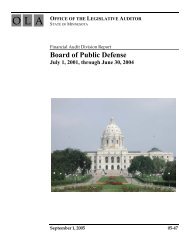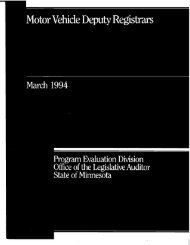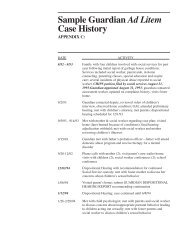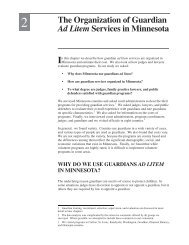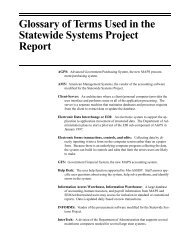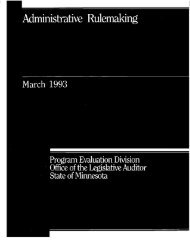Occupational Regulation - Office of the Legislative Auditor
Occupational Regulation - Office of the Legislative Auditor
Occupational Regulation - Office of the Legislative Auditor
Create successful ePaper yourself
Turn your PDF publications into a flip-book with our unique Google optimized e-Paper software.
EFFECTIVENESS OF OCCUPATIONAL REGULATION 77<br />
advisory boards in host agencies that would provide administrative services. The<br />
CORE study in <strong>the</strong> early 1990s also seemed motivated by concern with<br />
administrative efficiency when it recommended <strong>the</strong> creation <strong>of</strong> a central licensing<br />
agency to perform administrative functions for <strong>the</strong> boards that would remain<br />
independent.<br />
Administrative<br />
consolidation<br />
was <strong>the</strong> focus <strong>of</strong><br />
earlier studies,<br />
but we conclude<br />
that o<strong>the</strong>r<br />
problems are<br />
more urgent<br />
now.<br />
The Department <strong>of</strong> Administration made its recommendations after a detailed and<br />
lengthy study. However, in some ways its focus now seems quite out <strong>of</strong> date<br />
because <strong>the</strong> problem driving <strong>the</strong> recommendation to consolidate <strong>the</strong> regulatory<br />
boards into state agencies was <strong>the</strong> cost <strong>of</strong> typing, copying, and similar support<br />
services. The availability <strong>of</strong> less expensive computers and copiers have changed<br />
<strong>the</strong> economics <strong>of</strong> clerical services in <strong>the</strong> years since <strong>the</strong> report was written. Since<br />
<strong>the</strong> late 1970s <strong>the</strong> health boards have moved in a direction opposite to that<br />
envisaged by <strong>the</strong> Department <strong>of</strong> Administration report so that now <strong>the</strong>y receive<br />
virtually no administrative services from <strong>the</strong> Minnesota Department <strong>of</strong> Health<br />
whereas in <strong>the</strong> past <strong>the</strong>y were located in department <strong>of</strong>fices and received various<br />
support services from <strong>the</strong> department. We think <strong>the</strong> major problem caused by so<br />
many independent entities is not administrative inefficiency. Ra<strong>the</strong>r it is<br />
application <strong>of</strong> <strong>the</strong> state’s occupational regulatory policy articulated in Chapter 214<br />
and legislative and executive branch oversight. These are serious problems.<br />
Organizing <strong>the</strong> independent boards in some kind <strong>of</strong> umbrella agency as some<br />
o<strong>the</strong>r states such as Florida, Virginia, and Wisconsin have done could make it<br />
easier for <strong>the</strong> Legislature and <strong>the</strong> Governor to oversee <strong>the</strong> degree to which<br />
occupational regulation is achieving its intended purposes. However, as we<br />
discussed in Chapter 1, this idea has been proposed in <strong>the</strong> past and was strongly<br />
resisted. In <strong>the</strong> case <strong>of</strong> <strong>the</strong> health boards, <strong>the</strong>re is an evolutionary process that<br />
might lead to <strong>the</strong> same end, without a fight if <strong>the</strong> administrative services unit is<br />
expanded and <strong>the</strong> boards o<strong>the</strong>rwise cooperate in communicating with <strong>the</strong><br />
Legislature.<br />
It is an open question whe<strong>the</strong>r <strong>the</strong> health boards will succeed in establishing <strong>the</strong><br />
type <strong>of</strong> collaborative process and structure that will achieve greater administrative<br />
efficiency, collaboration on common challenges, and improved relations with <strong>the</strong><br />
Legislature and <strong>the</strong> public, but since some progress has been made it may be<br />
reasonable to continue down <strong>the</strong> same path.<br />
SUMMARY<br />
We conclude that <strong>the</strong>re are problems with Minnesota’s system <strong>of</strong> occupational<br />
regulation that need attention from <strong>the</strong> Legislature and executive branch agencies.<br />
While <strong>the</strong> problems are not intractable, <strong>the</strong> Legislature has not usually treated<br />
occupational regulation as a major issue, so it has proved difficult in <strong>the</strong> past to<br />
enact reforms and to carry out <strong>the</strong> work required to make <strong>the</strong> changes that are<br />
needed even in <strong>the</strong> absence <strong>of</strong> major legislation.<br />
The most serious problems we found are, first, <strong>the</strong> Legislature is not applying its<br />
occupational regulatory policy (Chapter 214) in a consistent or effective fashion.<br />
This is partly because <strong>the</strong>re is a proliferation <strong>of</strong> proposals for regulation and partly<br />
because <strong>the</strong>re is no legislative or executive branch <strong>of</strong>fice established to carry out<br />
<strong>the</strong> needed studies. Second, oversight <strong>of</strong> <strong>the</strong> boards and agencies responsible for



